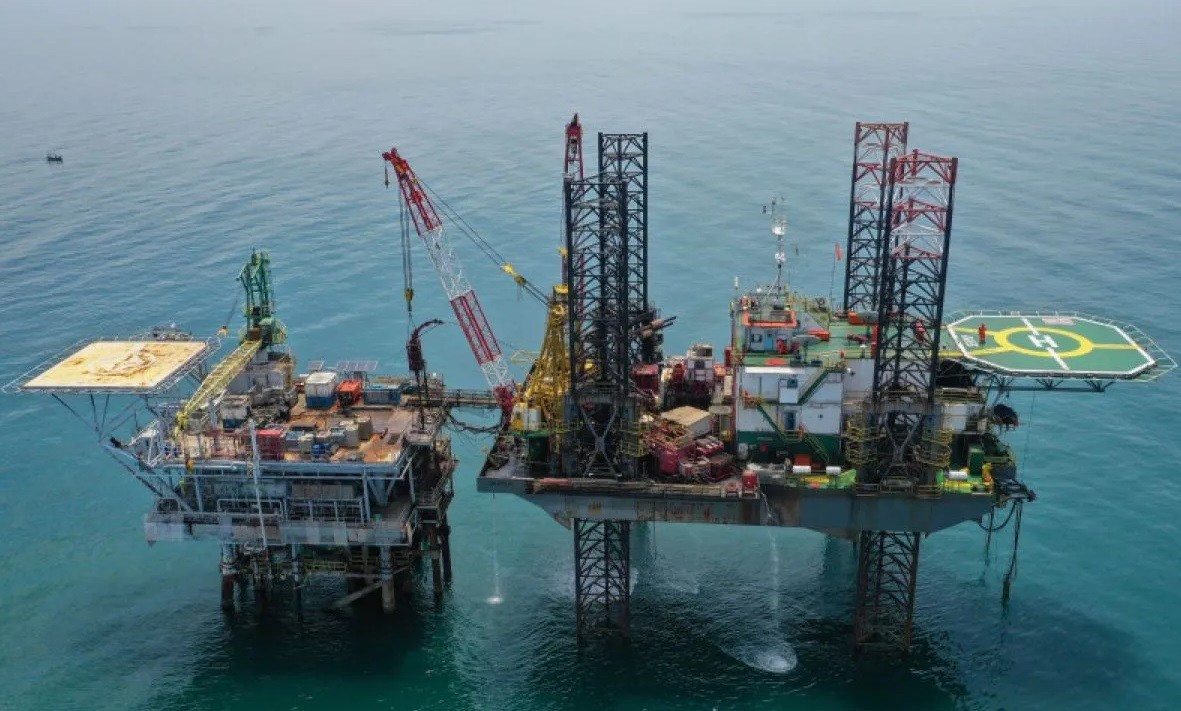News
Govt to end fuel imports from Singapore amid Trump tariffs
Tenggara Strategics May 20, 2025 An oil rig operates on April 2, 2023, in an oil and gas field managed by Pertamina Hulu Energi Offshore North West Java (PHE ONWJ) near Indramayu, West Java. (Antara/Aditya Pradana Putra)
An oil rig operates on April 2, 2023, in an oil and gas field managed by Pertamina Hulu Energi Offshore North West Java (PHE ONWJ) near Indramayu, West Java. (Antara/Aditya Pradana Putra)
The Indonesian government plans to cut off refined fuel imports from Singapore —its largest supplier, which currently accounts for approximately 54 percent of Indonesia’s total refined fuel needs. The move reflects a broader strategic shift in Indonesia’s energy import policy, aiming to cut costs and reposition the country within the evolving landscape of global trade, particularly in relation to the United States. However, concerns remain over whether the plan will truly deliver cost savings, given the higher logistics expenses involved, and whether Indonesia’s infrastructure is ready to support imports from more distant suppliers.
Energy Minister Bahlil Lahadalia confirmed that Indonesia will begin phasing out refined fuel imports from Singapore and redirect some of its sourcing to alternative suppliers, including the United States and the Middle East. The government hopes to fully implement the change within the next six months. The shift also ties into broader trade negotiations involving US energy products, particularly in response to high tariffs imposed under US President Donald Trump.
Bahlil emphasized that fuel sourced from Singapore is significantly more expensive than supplies from the Middle East, despite Singapore’s geographical proximity. “We’re paying a premium for the same raw materials,” he noted, calling attention to the persistent price gap. Singapore’s advantage in shipping distance has not translated into lower costs for Indonesia.
Indonesia’s reliance on Singapore for refined fuel has been long-standing. Between 2017 and 2022, Singapore remained the dominant supplier, with 2018 marking the peak year of imports at 17.85 million tons. That figure dropped sharply to 10.47 million tons in 2020 amid the COVID-19 pandemic. Yet, in 2024, Indonesia still imported over 15 million metric tons of refined fuel from Singapore—worth approximately US$11.4 billion—according to data from Statistics Indonesia (BPS). In December alone, imports reached US$1 billion.
Singapore, despite lacking crude oil reserves, operates one of the world’s largest refining hubs, re-exporting a significant share of its fuel output to Indonesia. As Indonesia’s domestic fossil fuel production has declined, this dependency has deepened, with imports from Singapore reaching around 290,000 barrels of refined fuel per day.
However, experts have raised concerns over the economic and logistical implications of the government’s new policy. Critics argue that replacing Singapore with suppliers from the US or Middle East may introduce new inefficiencies. Singapore’s refineries produce specialized fuel blends like Pertalite that are tailored to Indonesia’s vehicle engine standards—fuels not readily available from other suppliers. The switch could lead to mismatched fuel specifications, supply disruptions, and increased operational complexity. Furthermore, Singapore’s proximity gives it a clear logistical edge that’s hard to beat.
Some analysts suggest that the shift is also motivated by geopolitical pressures, particularly from Washington. With Indonesia reluctant to import more US-made manufactured goods, refined oil could serve as a middle ground in reducing the US trade deficit with Indonesia.
To support the policy shift, the Indonesian government is ramping up investment in port infrastructure to enable larger vessels to dock and offload fuel from more distant sources such as the Middle East and the United States. Energy Minister Bahlil Lahadalia emphasized that these upgrades are critical to ensuring long-term fuel security and greater flexibility in sourcing.
However, developing the necessary port facilities poses significant logistical and financial challenges. Many of Indonesia’s key fuel terminals and ports were originally designed to handle smaller tankers arriving from nearby Singapore. Expanding capacity to accommodate Very Large Crude Carriers (VLCCs) or other large vessels requires extensive dredging, land reclamation, new docking systems, and regulatory approvals—projects that can take years to complete. Moreover, delays in construction could create a supply bottleneck if alternative import routes are established before the infrastructure is fully operational, putting additional strain on fuel availability and domestic distribution.
Despite these concerns, the government appears intent on pursuing a long-term strategy that reduces reliance on a single supplier and strengthens Indonesia’s negotiating leverage in international trade. Whether these benefits will outweigh the risks remains to be seen, especially as infrastructure constraints and market realities begin to shape the policy’s real-world implementation.
What we've heard
An executive at an oil company has said that pressure from the United States’ trade war and the gradual sidelining of Muchamad Riza Chalid from Indonesia’s oil import business have created an opportunity for Energy and Mineral Resources Minister Bahlil Lahadalia to begin shifting fuel imports away from Singapore to other countries. These include plans to source fuel from the United States and several Middle Eastern nations.

